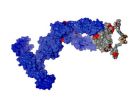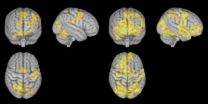(Press-News.org) (TORONTO, Canada – May, 15, 2014) -- The overall quality of death of cancer patients who die in an urban Canadian setting with ready access to palliative care was found to be good to excellent in the large majority of cases, helping to dispel the myth that marked suffering at the end of life is inevitable.
"Fear of dying is something almost every patient with advanced cancer or other life-threatening illness faces, and helping them, to achieve a "good death" is an important goal of palliative care," says Dr. Sarah Hales, Coordinator of Psychiatry Services, Psychosocial Oncology & Palliative Care, Princess Margaret Cancer Centre. "We know a lot about disease and the physical symptoms that it may produce, but only recently have we focused on approaches to relieve the fear of death in patients and families and to address the emotional, spiritual and existential concerns that support the quality of the dying experience."
Link to video of Dr. Sarah Hales: https://www.youtube.com/watch?v=ecYCvLF9M1w
Understanding the multiple dimensions of the dying process has helped us better care for patients and families at this stage of life, says Dr. Rodin, Head of the Department of Psychosocial Oncology and Palliative Care at the Princess Margaret Cancer Centre. "We have found that individuals evaluate differently the dimensions of the experience, which include symptom control, the sense of life closure and facing the end of life without overwhelming fear. The perspectives of patients on these issues at the end of life may differ from those of their family and health care providers."
The study, entitled "The Quality of Dying and Death in Cancer and Its Relationship to Palliative Care and Place of Death," is in press but on-line in the prestigious Journal of Pain and Symptom Management, with Dr. Sarah Hales, Lecturer, Department of Psychiatry, University of Toronto as lead author, as well as Drs. Camilla Zimmerman, Head of Palliative Care at the Princess Margaret, and Gary Rodin, Professor of Psychiatry at the University of Toronto and Academic Director of the Kensington Hospice.
Thirty-nine percent (39%) of the sample scored in the "good' to "almost perfect" range of a scale measuring the dying experience, with 61% of the sample scoring in the "neither good nor bad" range of the scale. Better scores were linked to older patients, high social support (most patients were not living alone), older caregiver age, English as the primary language of the caregiver, greater length of relationship between the caregiver and patient, less caregiver bereavement distress (i.e. grief, stress-response, and depressive symptoms) and home death.
The study examined 402 deaths of cancer patients between 2005 and 2010 in the three acute care hospitals of University Health Network and from the Tammy Latner Centre for Palliative Care, a home palliative care program at Mount Sinai Hospital in Toronto. Caregivers of the patients who spoke and read English were contacted and, those who agreed, were interviewed about the quality of death and dying using the Quality of Dying and Death (QODD) questionnaire, the most widely used and best validated tool to assess the dying experience.
The questionnaire includes 31 items covering symptoms and personal care, treatment preferences, time with family, whole person concerns, preparation for death, and the moment of death, with special attention to four key domains: Symptom Control, Preparation (i.e. visiting with spiritual advisor, avoiding life support, having funeral arrangements in order), Connectedness (i.e. spending time with family and friends), Transcendence (i.e. feeling unafraid of dying, feeling at peace with dying, feeling untroubled about strain on loved one). A total score on all variables was calculated from 0 to 100.
About one-third of all the cancer deaths occurred at home, while 40% occurred in an inpatient hospice/palliative care unit and 28% in an acute care hospital.
Receiving late or no palliative care was most common amongst those dying in a hospital, followed by those dying in a hospice/palliative care unit and least common amongst those dying at home. A late or no referral did not contribute to a worse overall quality of dying and death, but the authors state that this may mean that oncologists and family physicians provide good end-of- life care and that those who have more complicated illnesses are more likely to be referred to palliative care.
Home deaths were linked to better overall scores on the death experience, along with better Symptom Control and Preparation scores than dying in an acute-care or hospice setting. Surprisingly, home death with briefer palliative care was linked to better preparation and overall quality of dying than home death with longer palliative care involvement (i.e. greater than seven days).
In another surprise finding, there was no significant difference between a death in a hospice or palliative care setting and an acute care hospital. "You can have a good death in a hospice or a hospital setting when there is high quality palliative care," says Dr. Hales. "Caregivers often feel incredibly guilty about their loved ones dying in hospital, but it may not always be possible to die at home. Complicated symptoms, lack of advanced care planning and caregivers who feel overwhelmed with the process could indicate that a hospice or hospital death might be better for the patient and the family."
Although the dying and death experience ratings were generally positive, for a substantial minority, symptom control and death-related distress at the end of life were problematic. Fifteen per cent (15%) of the sample scored in the "terrible" to "poor" range for symptom control, with 19 percent scoring in the same range for Transcendence – feeling unafraid of or making peace with dying. These could be areas in which further interventions are needed to improve outcomes, say the authors.
INFORMATION:
The study was supported by the Canadian Institutes of Health Research, a National Cancer Institute of Canada Fellowship, The Princess Margaret Cancer Foundation Hertz Centre Fund, the Campbell Family Cancer Research Institute and the Ontario Cancer Institute at the Princess Margaret Cancer Centre, University Health Network, and by the Ontario Ministry of Health and Long-Term Care.
About Princess Margaret Cancer Centre, University Health Network
Princess Margaret Cancer Centre has achieved an international reputation as a global leader in the fight against cancer and delivering personalized cancer medicine. The Princess Margaret, one of the top five international cancer research centres, is a member of the University Health Network, which also includes Toronto General Hospital, Toronto Western Hospital and Toronto Rehabilitation Institute. All are research hospitals affiliated with the University of Toronto. For more information: http://www.theprincessmargaret.ca or http://www.uhn.ca .
Next frontier: How can modern medicine help dying patients achieve a 'good' death?
2014-05-15
ELSE PRESS RELEASES FROM THIS DATE:
Study shows young men increasingly outnumber young women in rural Great Plains
2014-05-15
Lincoln, Neb., May 15, 2014 -- In many rural communities hard hit by decades of population declines, young men increasingly outnumber young women, a new study of Kansas and Nebraska census data shows.
In places with 800 or fewer residents, the proportion of young men increased by an average of nearly 40 percent as people went from their teens to their 20s.
Those findings suggest leaders should consider the needs of young women in their economic and community development plans, said Robert Shepard, a University of Nebraska-Lincoln doctoral candidate ...
Most NHL players peak by age 29: Study
2014-05-15
A new University of British Columbia study identifies when the clock runs out on an NHL player's peak performance, giving team executives insight into how best to build a roster.
The study by Sauder School of Business professor James Brander found that the performance of forwards peaks between the ages of 27 and 28. Defencemen are best between 28 and 29, and the performance of goaltenders varies little by age.
The forthcoming study to be published in the Journal of Quantitative Analysis in Sports also reveals that players performed close to their peak levels for a ...
Learning from sharks
2014-05-15
This news release is available in German.
Custom-tailored antibodies are regarded as promising weapons against a multitude of serious illnesses. Since they can accurately recognize specific structures on the surface of viruses, bacteria or cancer cells, they are already being deployed successfully in cancer diagnostics and therapy, as well as against numerous other diseases. The stability of the sensitive antibodies is a decisive factor in every step, from production and storage to therapeutic application.
A team of researchers headed by Dr. Matthias J. Feige and ...
Where have all the mitochondria gone?
2014-05-15
It's common knowledge that all organisms inherit their mitochondria – the cell's "power plants" – from their mothers. But what happens to all the father's mitochondria? Surprisingly, how – and why – paternal mitochondria are prevented from getting passed on to their offspring after fertilization is still shrouded in mystery; the only thing that's certain is that there must be a compelling reason, seeing as this phenomenon has been conserved throughout evolution.
Now, Dr. Eli Arama and a team in the Weizmann Institute's Molecular Genetics Department have discovered special ...
Sugar implicated in cardiovascular disease risk independent of weight gain
2014-05-15
Researchers from New Zealand's University of Otago have uncovered evidence that sugar has a direct effect on risk factors for heart disease, and is likely to impact on blood pressure, independent of weight gain.
Research Fellow with Otago's Department of Human Nutrition Dr Lisa Te Morenga, Professor Jim Mann and colleagues have conducted a review and meta-analysis of all international studies that compared the effects of higher versus lower added sugar consumption on blood pressure and lipids (blood fats or cholesterol) – both of which are important cardiovascular risk-factors.
They ...
This is your brain on meditation
2014-05-15
Mindfulness. Zen. Acem. Meditation drumming. Chakra. Buddhist and transcendental meditation. There are countless ways of meditating, but the purpose behind them all remains basically the same: more peace, less stress, better concentration, greater self-awareness and better processing of thoughts and feelings.
But which of these techniques should a poor stressed-out wretch choose? What does the research say? Very little – at least until now.
A team of researchers at the Norwegian University of Science and Technology (NTNU), the University of Oslo and the University ...
HIV patient nutrition more vital than once assumed
2014-05-15
Roughly 25 million Africans live with HIV, many of who now have access to antiretroviral drugs (ARVs). Among their side effects, ARVs can cause patients to put on weight. Subsequently, attention paid to malnutrition among African HIV patients has waned. However, widespread malnutrition has been identified as a reason that up to a quarter of HIV patients in a number of African countries die just months after beginning medical treatment.
A collaborative project between the University of Copenhagen and Jimma University, Ethiopia has demonstrated that daily nutritional supplementation ...
The state of rain
2014-05-15
Using modern weather satellites to monitor rainfall has become a robust, widely practiced technique. However, establishing a reliable context for relating space-based rainfall observations to current and historical ground-based rainfall data has been difficult.
A new dataset developed in partnership between UC Santa Barbara and the U.S. Geological Survey (USGS) can be used for environmental monitoring and drought early warning. The Climate Hazards Group Infrared Precipitation with Stations (CHIRPS), a collaboration between UCSB's Climate Hazards Group and USGS's Earth ...
Study finds hazardous flame retardants in preschools
2014-05-15
Berkeley — A new study of preschools and day care centers finds that flame retardants are prevalent indoors, potentially exposing young children to chemicals known to be hazardous.
The study, to appear online Thursday, May 15, in the journal Chemosphere, was led by researchers at the University of California, Berkeley, and funded by the California Air Resources Board. Although many infants and young children spend up to 50 hours per week in day care, the study authors noted that this paper represents the first systematic review of flame retardants in early child care ...
West Antarctic Ice Sheet collapse is under way
2014-05-15
The West Antarctic Ice Sheet, which holds enough water to raise global seas by several feet, is thinning. Scientists have been warning of its collapse, based on theories, but with few firm predictions or timelines.
University of Washington researchers used detailed topography maps and computer modeling to show that the collapse appears to have already begun. The fast-moving Thwaites Glacier will likely disappear in a matter of centuries, researchers say, raising sea level by nearly 2 feet. That glacier also acts as a linchpin on the rest of the ice sheet, which contains ...




